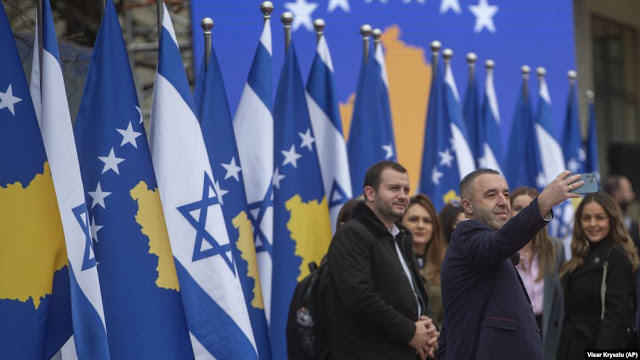The Return of the Peace Processors
The establishment conversation on Israel and its neighbors has been dominated for more than 30 years by members of a guild referred to as the peace processors. The foundational premises that animate the guild's work in the Middle East have been shown, repeatedly and consistently, to be simply wrong. The reaction of the peace processors to the repeated failures of the real world to live up to their expectations speaks to an intellectual community that is blind to the realities of Middle East politics.Richard Goldberg: The U.N. Refugee Agency With Few Actual Refugees
Recognizing Jerusalem as Israel's capital, we were told, was going to lead to an explosion of violence across the Muslim world, but nothing of the sort happened. A fence separating Israel from the West Bank was said to be doomed to fail because it didn't address the real motivations of suicide bombers, yet after the fence was built, suicide bombing dwindled. By achieving autonomy for the Palestinians in the West Bank and Gaza, the Oslo Accords were supposed to lead to a reduction in violence. Instead they led almost instantly to a massive increase in violence.
Israeli settlement activity in the West Bank is said to be killing the peace process and that "time is running out" for a two-state solution. Yet the number of Israeli settlements in the West Bank remained largely unchanged and the amount of West Bank land built up remained between 1.5 and 2%. Moreover, the demographic balance between Israelis and Palestinians didn't change. Just as the number of Jews in the West Bank grew, so too did the number of Arabs.
In 2012, then- Sen. Mark Kirk of Illinois tried to answer this question. His amendment to an annual spending bill demanded an estimate of people receiving Unrwa services who were actually displaced by the 1948 war. The Obama administration delivered a classified answer in 2015. The State Department guarded the secret, even during the Trump years—until Mr. Pompeo’s tweets.
“Unrwa is not a refugee agency; it’s estimated <200,000 Arabs displaced in 1948 are still alive and most others are not refugees by any rational criteria,” Mr. Pompeo tweeted. “Taxpayers deserve basic truths: most Palestinians under UNRWA’s jurisdiction aren’t refugees, and UNRWA is a hurdle to peace. America supports peace and Palestinian human rights; UNRWA supports neither. It’s time to end UNRWA’s mandate.”
President Biden reportedly intends to restore funding to the agency. Some questions he needs to answer: Should America support more than five million people through a refugee agency if fewer than 200,000 of them are refugees? Why should the State Department’s refugee bureau oversee Unrwa if the majority of its registry are not refugees?
Since most people registered with Unrwa are citizens or permanent residents of another country—such as Jordan—or currently reside within the borders of a future Palestinian state, Congress should work with the administration to find bilateral solutions. America can still assist the remaining 200,000 refugees while supporting others outside the Unrwa framework.
Remarkably, there are no technical teams from the U.S. Agency for International Development or other federal agencies designing programs, projects, or budgets to help Palestinians registered with Unrwa achieve economic independence. In other words, there are no plans to improve their lives. That needs to change.
American oversight of the U.N. must also change. When the U.S. contributes to U.N. agencies, it often takes a seat on the board to exercise basic oversight. Unrwa, however, has no board of governors and no oversight.
It took more than eight years, but we finally got the truth: Less than 5% of those on Unrwa’s registry are refugees. This means Unrwa is not a refugee agency, but something else entirely. That demands a bipartisan policy to halt the abuse of taxpayer funding.
Gerald M. Steinberg: A Pragmatic Peace for Israelis and Palestinians
For more than 70 years, peace between Palestinians and Israelis has eluded the most dedicated and experienced negotiators. Grand plans that focus exclusively on Palestinian perspectives, and downplay deeply embedded Israeli insecurity, including the growing Iranian threat, have no chance of success. And there is no value in presenting proposals that fail to consider the deep conflict between Hamas and Fatah, or the lack of a Palestinian leadership capable of reaching a historic compromise. The Palestinians and their supporters claim that the establishment of a sovereign state in which the Jewish people are the majority, with Jewish symbols, violates their rights. For Israelis, the injustices began with the Arab rejection of the 1947 UN Partition Plan, followed by an invasion aimed at "throwing the Jews into the sea," denying 4,000 years of Jewish history in this land, including Jerusalem. Palestinians have the potential for realizing the benefits of peace and cooperation, but this will require a willingness to let go of the goal of reversing the establishment of Israel. New leadership focused on improving the lives of Palestinians is necessary. To avoid doing harm, and to make lasting contributions, peacemakers should focus on steps that promote cooperation, rather than adding to the conflict.









































